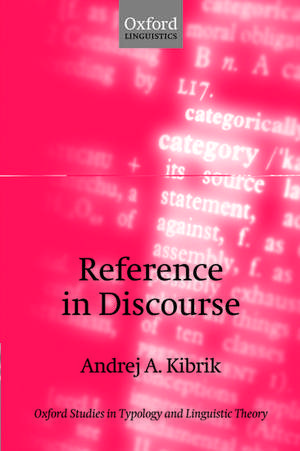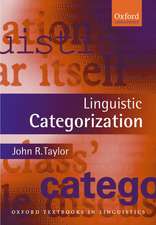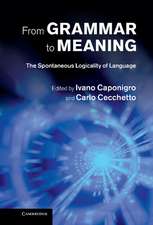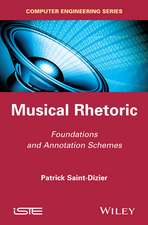Reference in Discourse: Oxford Studies in Typology and Linguistic Theory
Autor Andrej Kibriken Limba Engleză Hardback – sep 2011
Din seria Oxford Studies in Typology and Linguistic Theory
- 26%
 Preț: 629.79 lei
Preț: 629.79 lei - 30%
 Preț: 906.85 lei
Preț: 906.85 lei - 31%
 Preț: 468.31 lei
Preț: 468.31 lei - 22%
 Preț: 414.48 lei
Preț: 414.48 lei - 22%
 Preț: 413.32 lei
Preț: 413.32 lei - 27%
 Preț: 379.03 lei
Preț: 379.03 lei - 27%
 Preț: 377.67 lei
Preț: 377.67 lei - 27%
 Preț: 330.40 lei
Preț: 330.40 lei - 34%
 Preț: 1038.39 lei
Preț: 1038.39 lei - 8%
 Preț: 351.39 lei
Preț: 351.39 lei - 31%
 Preț: 373.07 lei
Preț: 373.07 lei - 22%
 Preț: 198.16 lei
Preț: 198.16 lei - 27%
 Preț: 487.17 lei
Preț: 487.17 lei - 26%
 Preț: 388.02 lei
Preț: 388.02 lei - 34%
 Preț: 835.76 lei
Preț: 835.76 lei - 34%
 Preț: 948.82 lei
Preț: 948.82 lei - 18%
 Preț: 400.82 lei
Preț: 400.82 lei - 18%
 Preț: 381.47 lei
Preț: 381.47 lei
Preț: 843.73 lei
Preț vechi: 1270.41 lei
-34% Nou
Puncte Express: 1266
Preț estimativ în valută:
161.47€ • 175.33$ • 135.63£
161.47€ • 175.33$ • 135.63£
Carte tipărită la comandă
Livrare economică 11-17 aprilie
Preluare comenzi: 021 569.72.76
Specificații
ISBN-13: 9780199215805
ISBN-10: 0199215804
Pagini: 682
Ilustrații: Figures, Tables
Dimensiuni: 173 x 240 x 60 mm
Greutate: 1.16 kg
Editura: OUP OXFORD
Colecția OUP Oxford
Seria Oxford Studies in Typology and Linguistic Theory
Locul publicării:Oxford, United Kingdom
ISBN-10: 0199215804
Pagini: 682
Ilustrații: Figures, Tables
Dimensiuni: 173 x 240 x 60 mm
Greutate: 1.16 kg
Editura: OUP OXFORD
Colecția OUP Oxford
Seria Oxford Studies in Typology and Linguistic Theory
Locul publicării:Oxford, United Kingdom
Recenzii
Not only does the volume offer an extensive literature review of one form of referencing, but it also contributes many new ideas about how referencing decisions are made. Kibrik may be embarrassed that it took him this long to finish the book; but we should all be so fortunate as to produce a monograph that is as carefully constructed and intellectually adventurous as his.
this is a remarkable book, which can inspire many students and researchers. It is highly desirable that the approach employed in this book be further tested on larger corpora, on texts from other genres, and with languages of different genealogical and areal origins.
Reference in Discourse is a book of great merits and enormous importance for the whole field of linguistics.
this is a remarkable book, which can inspire many students and researchers. It is highly desirable that the approach employed in this book be further tested on larger corpora, on texts from other genres, and with languages of different genealogical and areal origins.
Reference in Discourse is a book of great merits and enormous importance for the whole field of linguistics.
Notă biografică
Andrej A. Kibrik is Leading Researcher at the Institute of Linguistics of the Russian Academy of Sciences, Moscow, from which he received his PhD in 1988. In the Institute of Linguistics he heads the working group that prepares and publishes the multi-volume encyclopedic publication "Languages of the World ". In addition, he is Professor at the Department of Theoretical and Applied Linguistics in Moscow State University. He has published articles on linguistics in over 200 publications.

















